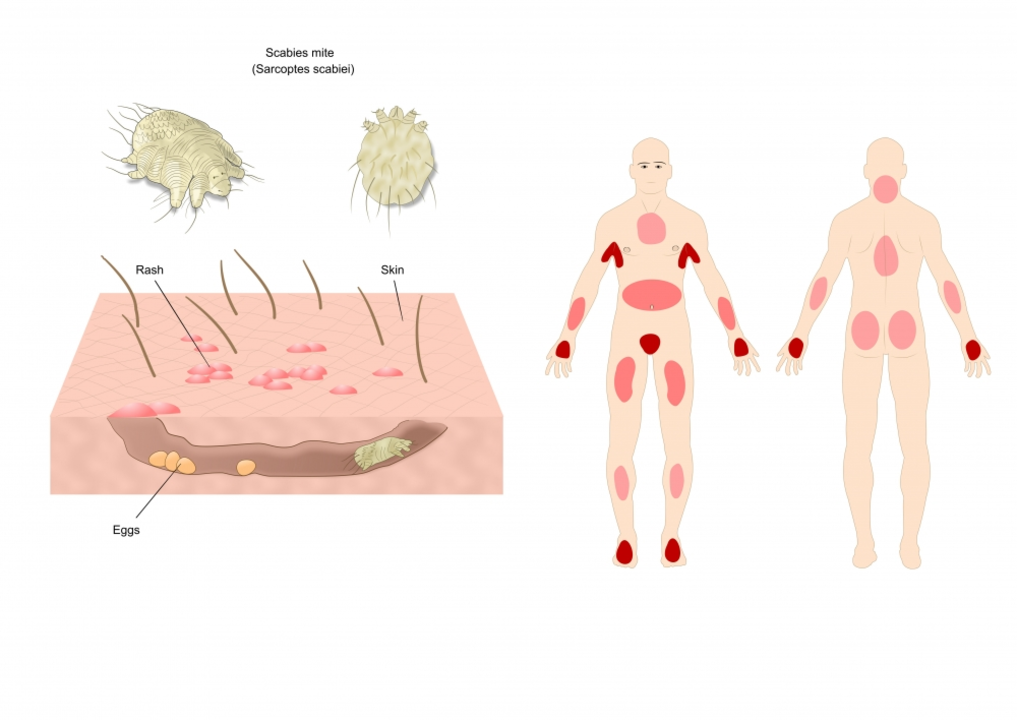Introduction to Sarcoptes scabiei and the Need for a Vaccine
As a blogger and health advocate, I am always on the lookout for new information about diseases and potential treatments. One such disease that has caught my attention is the Sarcoptes scabiei infestation, more commonly known as scabies. This contagious skin infestation is caused by a microscopic mite and can cause severe itching and rashes. The need for a vaccine to prevent scabies infestations is crucial, as it would greatly improve the quality of life for those affected and reduce the spread of the disease. In this article, I will discuss the potential for a vaccine to prevent Sarcoptes scabiei infestations, including the challenges faced in its development and the benefits it would bring.
Understanding Scabies: Symptoms and Transmission
Scabies is a skin infestation caused by the Sarcoptes scabiei mite, which burrows into the upper layer of the skin to lay its eggs. The infestation leads to intense itching and a pimple-like rash, which can occur anywhere on the body but is most commonly found in skin folds, such as between the fingers, under the breasts, and around the waist. Scabies is highly contagious and can spread through close physical contact or by sharing clothing, bedding, or towels with an infected person. Infestations are more common in crowded living conditions and in places where close contact is frequent, such as nursing homes and childcare centers.
Current Treatment Options and Their Limitations
Currently, the primary treatment for scabies involves the use of topical creams and lotions containing chemicals like permethrin, which work by killing the mites and their eggs. While these treatments can be effective, they often require multiple applications and can cause side effects such as skin irritation and burning. Additionally, there is a growing concern about the potential for mites to develop resistance to these treatments, making them less effective over time. This highlights the need for a more effective and long-lasting solution, such as a vaccine, to prevent scabies infestations from occurring in the first place.
The Potential for a Scabies Vaccine
Researchers have been exploring the possibility of a vaccine to prevent scabies infestations for several years. This would work by stimulating the body's immune system to recognize and attack the mites, preventing them from establishing a successful infestation. A vaccine would offer several advantages over current treatments, including long-lasting protection, reduced risk of side effects, and a lower likelihood of mite resistance. However, developing a vaccine for scabies has proven to be a challenging task, with several obstacles standing in the way of its realization.
Challenges in Developing a Scabies Vaccine
One of the main challenges in developing a vaccine for scabies is the complex nature of the mite's life cycle and its interaction with the human host. Unlike viruses and bacteria, which can be targeted by traditional vaccines, mites are multicellular organisms with a more complicated biology. This makes it more difficult to identify potential vaccine targets that would be effective in preventing infestations.
Another challenge is the lack of a suitable animal model for studying scabies. While some animals, such as pigs and dogs, can be infested with similar mites, their biology and immune response may differ significantly from that of humans. This makes it difficult to draw conclusions about the effectiveness of potential vaccine candidates and hinders the development process.
Progress Toward a Scabies Vaccine
Despite these challenges, researchers have made progress in recent years toward the development of a scabies vaccine. By studying the proteins produced by the mites during infestation, scientists have identified several potential vaccine targets. Some of these proteins have been shown to trigger an immune response in animal models, suggesting that they could form the basis for a future vaccine.
Additionally, advances in genetic sequencing and bioinformatics have enabled researchers to better understand the mite's biology and identify additional targets for potential vaccines. While a scabies vaccine is not yet available, these discoveries represent important steps toward its eventual development.
The Benefits of a Scabies Vaccine
A vaccine to prevent scabies infestations would bring numerous benefits to both individuals and public health as a whole. For those who are prone to infestations, a vaccine would provide long-lasting protection and reduce the need for repeated treatments, which can be time-consuming, uncomfortable, and expensive. Furthermore, a vaccine would help to reduce the spread of scabies in crowded living conditions and other high-risk environments, ultimately lowering the overall prevalence of the disease.
Conclusion
In conclusion, the potential for a vaccine to prevent Sarcoptes scabiei infestations is both promising and necessary. While significant challenges remain in its development, advances in research and technology have brought us closer to this goal. A scabies vaccine would provide invaluable protection to those at risk of infestation and help to reduce the global burden of this highly contagious and uncomfortable disease. As a health advocate, I will continue to follow the progress of scabies vaccine research and share updates with my readers, in the hope that a viable solution will soon be available.





Khanyisa Mhlongo
This is actually huge for communities where scabies spreads like wildfire in crowded homes or refugee camps. I've seen it firsthand in rural South Africa-kids scratching all night, parents too poor to afford permethrin. A vaccine wouldn't just be medical progress, it'd be justice. 🙏
Chloe McDonald
I didn't even know scabies could be vaccinated against. That's wild. I thought it was just wash your sheets and hope for the best.
Hobert Finn Bodfish
Of course the CDC is dragging their feet. Big Pharma doesn't make money off vaccines for poor people's skin mites. They want you buying $200 creams every 6 months. 💸
Nancy Lowry
This is why we need to stop pretending science is neutral. If this were a disease that affected rich white people, we'd have a vaccine by now. But since it's mostly poor, homeless, or undocumented folks? Nah. Let 'em itch.
Tom McInnes
Fascinating. The immunological complexity of arthropod-host interaction remains underexplored compared to viral pathogens. A vaccine would represent a significant leap.
Danie Joy
They're lying about the mites. It's not the mites. It's the chemicals in your soap. The government put nano-mites in your toothpaste to sell you creams. You think they want you cured? They want you addicted. 🤫
Leo Lee
You people are ridiculous. This isn't some mystical mystery. We've had the science for decades. The only thing stopping a vaccine is laziness and funding priorities. Stop acting like it's magic and start demanding action.
Stephanie Cepero
I just want to say how brave it is to write about this. So many people suffer in silence because they're ashamed. You're helping normalize the conversation, and that matters more than you know. 💛
Daniel Rogers
This gives me hope! 🌟 Imagine not having to scrub your skin raw every time someone sneezes near you. I'm rooting for the scientists. Let's fund this like it's a moon mission.
Tracy Blake
You know... if we think about it, the mite is just trying to survive too. It's not evil. It's just... existing. And maybe we're the ones who invaded its habitat. Like when we bulldoze forests for condos. 🤔 Maybe the real question isn't how to kill the mite... but how to live with it without suffering. Or maybe I'm just overthinking it again. 😅
Michael Tribone
Honestly, if you're reading this and you're a researcher or grad student? Do this. Pick this topic. It's underfunded, underappreciated, and you could literally change millions of lives. No ego, no glory-just real impact. Go for it.
Andrea Galetto
I'm surprised anyone still thinks topical treatments are viable. This is 2023. We have CRISPR. We have AI-driven protein modeling. A scabies vaccine is a low-hanging fruit for any well-funded lab. The fact that it doesn't exist says more about institutional decay than scientific limits.
Chris Remo
My grandma had scabies back in '78. Took her three months to get rid of it. She used kerosene and a brush. No joke. If we can land rovers on Mars, we can make a vaccine for this. Come on.
Isabel Piaggi
I think the real issue is we dont even know how many people have it because its so stigmatized like lice but way worse like imagine your skin just... crawling and no one believes you because you dont smell bad or look dirty and its just... you know? 🤕
Michael Herr
Vaccine research is slow because the mite doesn't replicate fast enough to trigger strong immune memory. We need better adjuvants and delivery systems. Not impossible. Just underprioritized.
Manvika Gupta
In India we use neem oil and turmeric paste. Works kinda. But its messy. A shot would be better. No more washing clothes 10 times a week. My cousin had it for 8 months. She cried every night.
Crystal Magnant
I just got diagnosed last week. I thought it was eczema. Took me 3 weeks to figure it out. I'm scared to tell my roommate. I feel so gross. I hope this vaccine comes soon.
Katherine Stapp
This is why America is falling behind. We let other countries lead in public health. China already has a Phase 2 trial. We're still debating if mites are alive. 🇺🇸😭